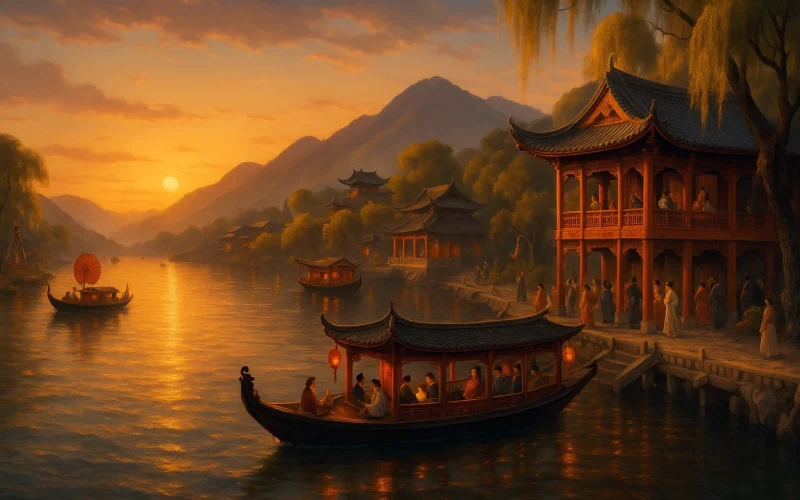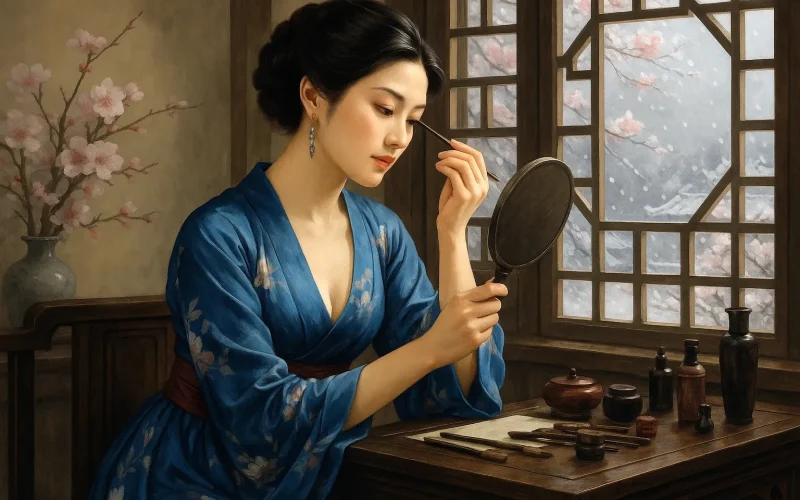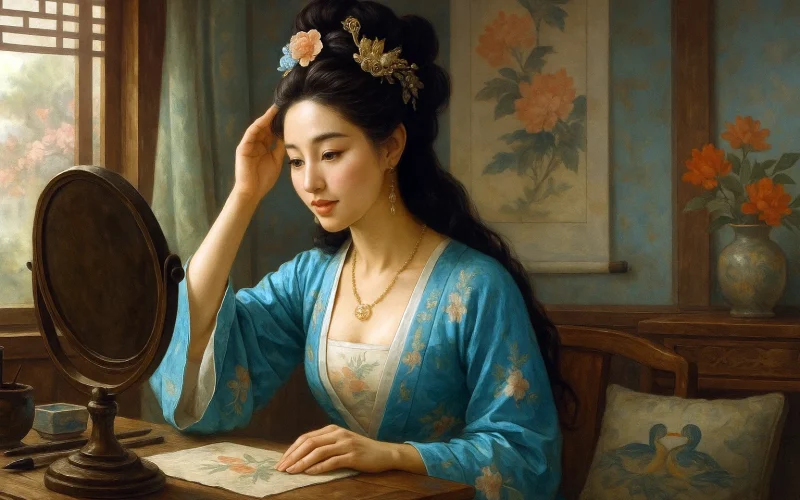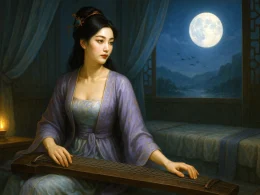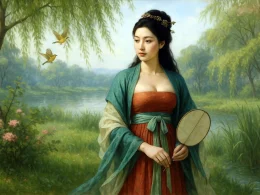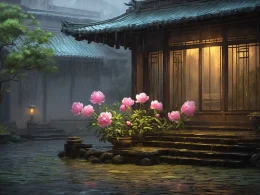On shore the sightseers chase painted boats;
The vernal waves beat shores and kiss the sky afloat.
Out of the willowed tower swings a maiden fair.
Don’t laugh at the grey-haired with flowers in their hair!
To the dance’s beat, wine cups go round again.
Where in life can we find more joy than in this strain?
Original Poem
「浣溪沙 · 堤上游人逐画船」
欧阳修
堤上游人逐画船,拍堤春水四垂天。
绿杨楼外出秋千。
白发戴花君莫笑,六幺催拍盏频传。
人生何处似尊前!
Interpretation
Composed during the Northern Song Dynasty—an era of social stability and urban leisure culture—this lyric by Ouyang Xiu, then a literary leader with deep fascination for folk customs, captures the zeitgeist of prosperous times. Through spring outings, feasting, and dance, "Silk-Washing Stream" (浣溪沙) constructs a world where revelry transcends age, showcasing the exuberant facet of Ouyang's poetic voice.
First Stanza: "堤上游人逐画船,拍堤春水四垂天。绿杨楼外出秋千。"
Dī shàng yóu rén zhú huà chuán, pāi dī chūn shuǐ sì chuí tiān. Lǜ yáng lóu wài chū qiū qiān.
On embankments, crowds chase painted boats adrift,
Spring waves lap shores where water greets the sky's wide lift.
Beyond willow-wreathed towers,
A swing arcs—then girls' laughter
Sweeps by on breezes swift.
The stanza orchestrates a spring symphony: the chasing crowds (逐画船) and lapping waves (拍堤春水) create kinetic energy, while the spatial vastness of "water meeting sky" (四垂天) establishes cosmic scale. The sudden appearance of the swing (秋千)—both visual pendulum and acoustic conduit—injects playful human vitality into the pastoral canvas.
Second Stanza: "白发戴花君莫笑,六幺催拍盏频传。人生何处似尊前!"
Bái fà dài huā jūn mò xiào, liù yāo cuī pāi zhǎn pín chuán. Rén shēng hé chù sì zūn qián!
"Mock not my grey hairs crowned with blooms—
Let 'Green Waist' drums speed our wine's rounds!
Where in life's course compares
To this cup-lifted hour?"
Here, temporal defiance becomes art: the floral-crowned白发 (white hair) symbolizes victory over aging, while the Tang dance tune "Green Waist" (六幺) accelerates the wine's circulation like a metabolic elixir. The rhetorical climax—"cup-lifted hour" (尊前)—transforms the drinking scene into a philosophical manifesto celebrating the present moment's supremacy over life's linear progression.
Holistic Appreciation
With rhythmic and picturesque language, this lyric poem vividly captures the bustling splendor of a spring day along the city's waterfront. The first stanza paints the scenery in rich, vibrant strokes, blending movement and stillness, near and far; the second shifts to emotion, using lively details like "white-haired yet adorned with flowers" and "cups passed in quick succession" to express the poet's affirmation and cherishing of life's joys.
Notably, this celebration of "aging without decline" and "joy without regret" embodies a unique worldly sentiment in Song dynasty poetry—one that neither shuns age nor status, but instead embraces the authenticity of human experience. It reflects the unfailing magnanimity that runs through Ouyang Xiu's lyrical works.
Artistic Merits
- Vivid Imagery: Water, sky, embankments, boats, willow trees, and swings interweave into a vibrant Jiangnan spring outing scene.
- Fusion of Scene and Emotion: Feelings are embedded in the scenery, and the scenery carries the poet's inner world—seamlessly and subtly.
- Lively and Sprightly Language: Phrases like "the 'Green Waist' tune quickens the beat" and "cups passed in quick succession" pulse with rhythmic energy.
- Candid and Relatable Theme: The bold depiction of "white-haired yet adorned with flowers" conveys a philosophy unbounded by age.
Insights
This poem reminds us that life's most beautiful moments often lie in the present—shared with friends over wine and laughter. Ouyang Xiu, white-haired yet still reveling in flowers and drink, embodies an attitude that refuses to be dimmed by age or constrained by convention. It teaches us: regardless of years or circumstance, as long as spring lingers in the heart, joy can be found everywhere. Such open-hearted exuberance—warm yet spirited—is an outlook worth treasuring and emulating in our fast-paced lives.
Poem Translator
Xu Yuanchong (许渊冲)
About the Poet
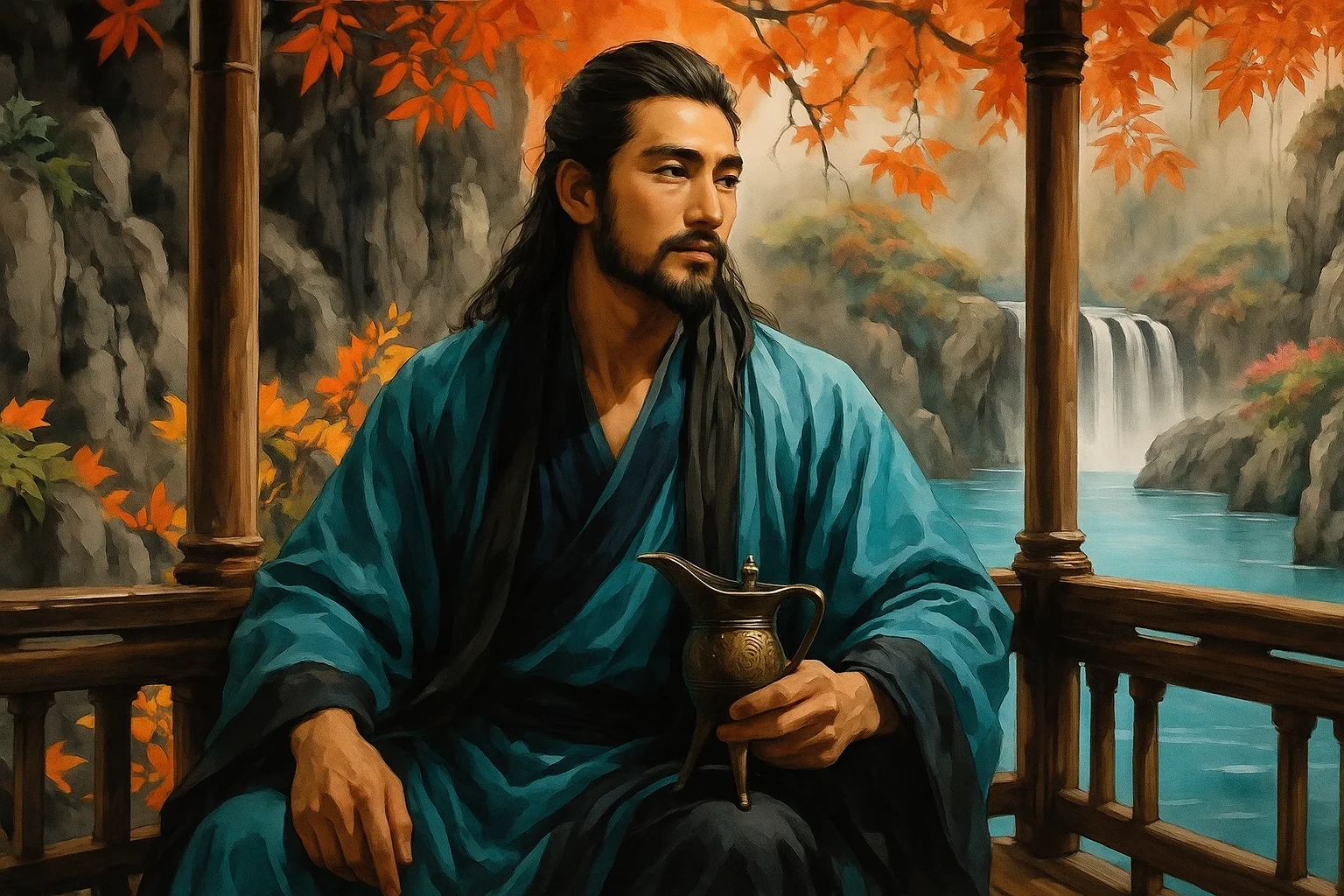
Ouyang Xiu (欧阳修, 1007 - 1072), a native of Yongfeng, Jizhou (present-day Jiangxi Province), emerged as the preeminent literary figure of the Northern Song Dynasty. After attaining the jinshi degree in 1030, he spearheaded a literary reform movement that rejected the ornate Xikun style prevalent at court. As a mentor who nurtured literary giants like Su Shi and Zeng Gong, he laid the foundation for the golden age of Northern Song literature. Recognized as one of the "Eight Great Prose Masters of Tang and Song," Ouyang stands as the pivotal figure in the transformation of Northern Song literary culture.






